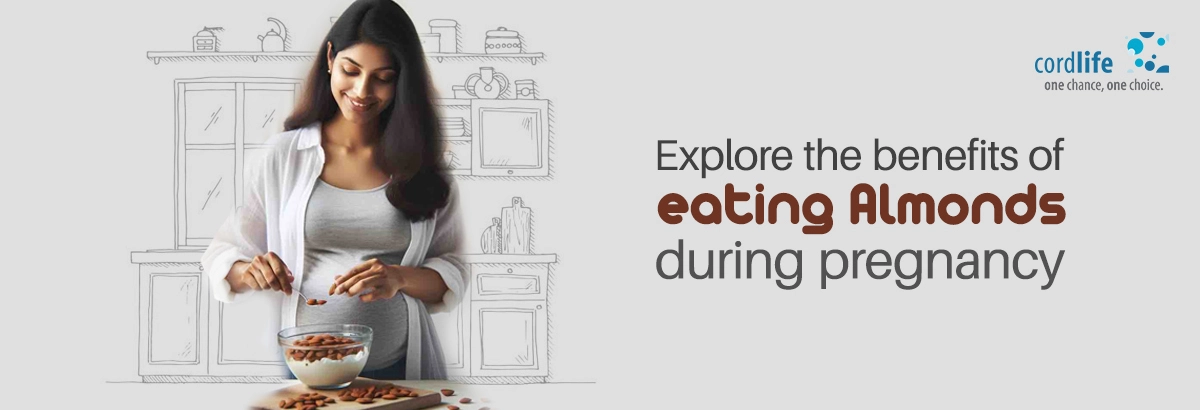Table of Contents
- How Beneficial Is Eating Almonds During Pregnancy?
- Prevents Morning Sickness
- An Excellent Source of Folic Acid
- A Good Source of Dietary Fibre
- Full of Dietary Fats and Carbs
- Almond Intake, Iron Intake
- Almonds Have Magnesium and Calcium Content
- Controls Weight
- Improves Pregnancy Memory
- How Many Almonds to Eat in a Day During Pregnancy?
A would-be-mummy’s diet would include everything nutritious – whether vegetarian, non-vegetarian, naturally sweet fruits, or slightly salty dry fruits, and nuts. Consuming a handful of nuts such as cashews, walnuts, pistachios, and almonds is nutrient-rich and extremely healthy for you and the baby-to-be.
How Beneficial Is Eating Almonds During Pregnancy?
When it comes to your pregnancy diet, raw and soaked almonds (badam), almond milk, and almond butter are worth the treat.
Here are the health benefits of almonds during pregnancy:
Prevents Morning Sickness
Morning sickness is mostly a first-trimester pregnancy discomfort. It makes you dizzy, nauseous, and puckish. Almonds during pregnancy can prevent this tendency.
An Excellent Source of Folic Acid
As per medical recommendation, you’d need about 400 mg of folic acid during pregnancy. They are significantly helpful for a baby’s neurological development while it develops slowly inside the womb.
A Good Source of Dietary Fibre
By the time you reach the 24th week of your pregnancy, you’d have to undergo a blood test to determine whether you have gestational diabetes. There is a risk of giving birth to a larger-than-normal baby via emergency C-section because of uncontrolled gestational diabetes. Intake of fibrous food in the first trimester of your pregnancy can prevent you from developing a health condition. Almonds are one of the very healthy sources of dietary fibre. Research has shown that eating almonds may reduce insulin sensitivity, keeping gestational diabetes on track. Additionally, being packed with fibre can help you treat pregnancy constipation and make your bowel movements smoother.
Full of Dietary Fats and Carbs
Almonds are rich in healthy dietary fats and carbohydrates, making them a nutritious snack during pregnancy. Almonds’ healthy fats and carbohydrates can provide sustained energy and contribute to the overall nutritional needs of both the mother and the developing baby. Almonds can reduce oxidative stress during pregnancy. Experts have linked oxidative stress to pregnancy, which may further impact placental function and foetal development. They can further reduce inflammation during pregnancy.
Almond Intake, Iron Intake
You’d require approximately 1000 mg of iron every day in your diet during the first trimester. After all, the life you’re nurturing inside you requires nutrients such as iron and oxygen for the development of the heart and immune system. Iron can also help you avoid anaemia and feel energised. So, eat almonds during pregnancy to get the iron supply in the right amounts.&
Almonds Have Magnesium and Calcium Content
Your healthcare practitioner recommends nearly 270 to 300 mcg of magnesium and 269 mcg of calcium. While magnesium reaches you through almonds, you can feel relief from some common symptoms during pregnancy – abdominal pain, leg cramps, fatigue, pregnancy constipation, etc., calcium in the right amounts may help bone formation, and maintain energy levels.
Controls Weight
Thanks to pregnancy hormones, and pregnancy cravings; you gain weight during pregnancy. Eating almonds is good for you when you’re hungry. The nutrients in almonds can keep you full for a long time and help you lose weight.
Improves Pregnancy Memory
As you proceed with your pregnancy, you tend to feel forgetful – known as pregnancy momnesia. Eating almonds every morning can improve your memory.
How Many Almonds to Eat in a Day During Pregnancy?
Try not to overconsume almonds during pregnancy. Potential risks like weight gain, allergies, digestive discomfort, blurred vision, diarrhoea, etc. are associated with it. Therefore, it is appropriate to consume an ounce or 28 grams of almonds during pregnancy.
You can snack on raw almonds, soak them in water overnight drink that water in the morning and put them in milk. You can alternately dice almonds finely, and sprinkle them on your favourite salad. What about baking them into muffins, and boosting your and your baby’s nutrition?
Overall, almonds are perfectly safe for you during pregnancy. Enjoy eating them and you have a healthy pregnancy journey.
